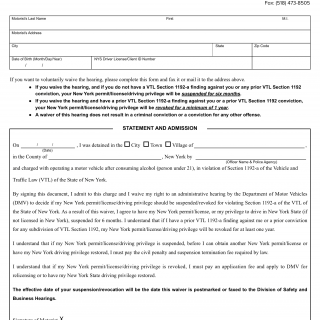NYS DMV Form AA-137A.1W. Waiver of Hearing for operating a motor vehicle after consuming alcohol, Person Under Age 21 (VTL 1192-A)
NYS DMV Form AA-137A.1W - Waiver of Hearing for Operating a Motor Vehicle After Consuming Alcohol, Person Under Age 21 (VTL 1192-A):
NYS DMV Form AA-137A.1W, also known as the Waiver of Hearing for Operating a Motor Vehicle After Consuming Alcohol, is a form specifically designed for individuals under the age of 21 in New York State who have been charged with operating a motor vehicle after consuming alcohol, as outlined in Vehicle and Traffic Law (VTL) section 1192-A.
The main purpose of this form is to provide an option for eligible individuals to waive their right to a formal hearing regarding the charges they are facing. By waiving the hearing, individuals acknowledge their guilt or responsibility for the offense and agree to accept the consequences and penalties associated with the violation.
The form consists of sections where the individual can provide their personal information, details about the offense, the circumstances surrounding the incident, and any other relevant information required by the Department of Motor Vehicles (DMV). Additionally, there may be sections for acknowledging the consequences of waiving the hearing and providing signatures from both the individual and their legal representative, if applicable.
Important fields in this form include the individual's personal information, detailed description of the offense, date and location, and signatures. It is crucial to accurately complete all required fields to ensure a valid waiver of the hearing process.
Application Examples and Use Cases:
1. Individuals under the age of 21 who have been charged with operating a motor vehicle after consuming alcohol in New York State can use this form to waive their right to a formal hearing. By doing so, they accept responsibility for the offense and agree to face the consequences and penalties associated with the violation.
2. This form can be used by individuals who prefer to resolve their case without going through the formal hearing process. By waiving the hearing, they expedite the resolution of their case and may have the opportunity to participate in alternative programs or penalties that may be offered as part of the waiver agreement.
3. Individuals who believe they have sufficient evidence to contest the charges against them and do not wish to admit guilt may choose not to use this form and instead proceed with a formal hearing. This form is specifically for those who are willing to accept responsibility and seek a more expeditious resolution.

